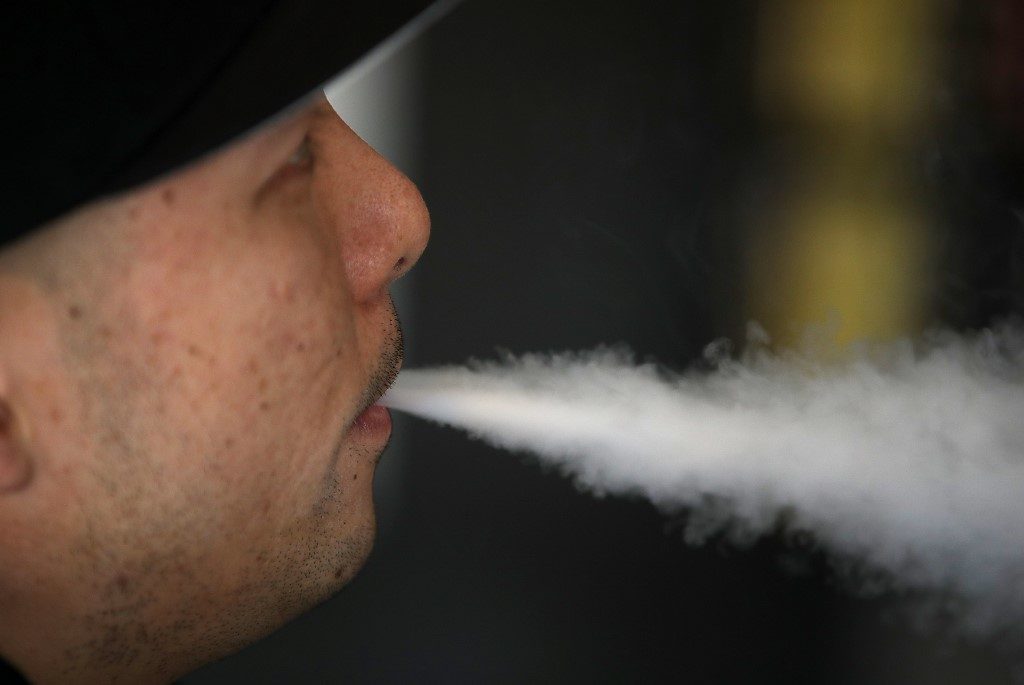SUMMARY
This is AI generated summarization, which may have errors. For context, always refer to the full article.

MANILA, Philippines – Even after the recently passed excise tax law made 21 the minimum age to purchase and use e-cigarettes, some House of Representatives members are looking to lower it to 18.
In its second hearing on February 13, the technical working group (TWG) voted 8-1 to lower age of access to e-cigarettes to 18 years old on the grounds that, since the Family Code sets the age of majority at 18, it should not be different for the case of e-cigarette access.
Health committee vice chair Representative Joet Garcia was the only dissenter.
Garcia pushed for a substantive discussion on the age provision during the 3rd TWG meeting on Tuesday, February 18, but his motion was sidelined by other matters.
“Allowing 18-year-olds to have access to e-cigarettes and heated tobacco products, I think, would not pose a serious threat to the youth simply because our laws determine the age of 18 as the age of majority. I think that is [reason] enough,” said Surigao del Norte Representative Robert Ace Barbers, author of an e-cigarette regulation bill.
Nongovernmental organizations and health advocates see it as a “retrogressive” action that endangers young people.
“The argument should not be that the rest – cigarettes, alcohol, driving – are 18. That’s the least-common-denominator argument which we should not apply when it comes to health. We should try to raise the minimum age for harmful activities, substances, and products,” said Southeast Asia Tobacco Control Alliance (SEATCA) executive director Ulysses Dorotheo.
The new excise tax law (Republic Act 11467) also prohibits flavored juices and pods apart from tobacco and menthol to lessen youth appeal. (READ: House seeks stronger regulation of e-cigarette use by minors)
The science
Garcia and health groups like the SEATCA push for the minimum access age to an even higher 25 years old.
According to a US Centers for Disease Control and Prevention report, the prefrontal cortex of the brain, which is involved in behaviors like impulse control and working memory, undergoes development until around 25 years of age.
While nicotine, the lead addictive subtance in e-cigarettes, is neurotoxic at any age, it is especially dangerous for developing brains, according to the Department of Health. The DOH also reported that non-smokers who start vaping are twice as likely to start smoking.
“In driving, for example, 17 is the minimum age [to drive with a licensed adult]. That’s because we want to prevent impulsive drivers – it involves your prefrontal cortex. Our perspective is we raise the minimum age for [e-cigarettes] now, and then Congress should also raise the minimum age for tobacco and alcohol,” said Dorotheo.
The firearms regulation act also has 21 as the minimum age to obtain a firearm license. “If you use the same rationale: I can drink, drive, smoke, [then] I can carry a gun at 18. That’s not what Congress approved, they made an exception,” said Dorotheo.
But Barbers said “we cannot compare oranges to apples,” as firearms pose threats for targets of gun users. He said the same cannot be applied to e-cigarettes, especially since “they are the best alternative to combustible smoking.”
Studies from the United Kingdom dub e-cigarettes as up to “95% less harmful” than cigarettes, although this data has been contested by credible groups, including SEATCA and the DOH. (READ: E-cigarettes: 5 things to know)
Protecting young people
With approximate 360,000 youths who have ever tried an e-cigarette in the Philippines, according to the World Health Organization, advocates like Child Rights Network (CRN) urge lawmakers to keep access age at 21 years old at least.
“CRN, the largest alliance of organizations and agencies pushing for children’s rights legislation in the Philippines, is firm in its position that regulation on electronic cigarettes must first and foremost protect the health and the future of the Filipinos, especially children,” CRN said in a statement.
The Philippines confirmed its first e-cigarette or vape-associated lung injury (Evali) in November 2019 in a 16-year-old girl from the Visayas. Within a few days of the announcement, President Rodrigo Duterte banned the use and importation of vapes.
The United States Surgeon General also declared a vaping epidemic in the US due to alarming surge of e-cigarette use among the youth. – Rappler.com
Add a comment
How does this make you feel?
There are no comments yet. Add your comment to start the conversation.